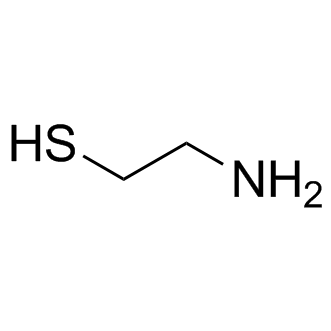
Cysteamine
CAS No. 60-23-1
Cysteamine ( β-MEA | β-Mercaptoethylamine | Decarboxycysteine | MEA | Thioethanolamine )
产品货号. M15246 CAS No. 60-23-1
肾病性胱氨酸病的治疗剂和抗氧化剂。
纯度: >98% (HPLC)
 COA
COA
 Datasheet
Datasheet
 HNMR
HNMR
 HPLC
HPLC
 MSDS
MSDS
 Handing Instructions
Handing Instructions
| 规格 | 价格/人民币 | 库存 | 数量 |
| 500MG | ¥405 | 有现货 |


|
| 1G | 获取报价 | 有现货 |


|
生物学信息
-
产品名称Cysteamine
-
注意事项本公司产品仅用于科研实验,不得用于人体或动物的临床与诊断
-
产品简述肾病性胱氨酸病的治疗剂和抗氧化剂。
-
产品描述An agent for the treatment of nephropathic cystinosis and an antioxidant; increases intracellular glutathione levels in cystinotic cells, also increases the rates of apoptosis in cystinotic cells; is an excellent scavenger of OH and HOCl and also reacts with H2O2; significantly increase the intracellular GSH levels; also causes autophagosome accumulation in cancer cells.Other Indication Approved.
-
体外实验——
-
体内实验——
-
同义词β-MEA | β-Mercaptoethylamine | Decarboxycysteine | MEA | Thioethanolamine
-
通路Autophagy
-
靶点Autophagy
-
受体Cystine|NPYR2|SomatostatinReceptor
-
研究领域Other Indications
-
适应症Other Disease
化学信息
-
CAS Number60-23-1
-
分子量77.14868
-
分子式C2H7NS
-
纯度>98% (HPLC)
-
溶解度10 mM in DMSO
-
SMILESNCCS
-
化学全称Ethanethiol, 2-amino-
运输与储存
-
储存条件(-20℃)
-
运输条件With Ice Pack
-
稳定性≥ 2 years
参考文献
1. Besouw, M, et al. Drug Discov Today, 2013. 18(15-16): p. 785-92.
2. de Matos, D.G, et al. Mol Reprod Dev, 1995. 42(4): p. 432-6.
3. Wan XM, et al. Int J Cancer. 2011 Sep 1;129(5):1087-95.
产品手册




关联产品
-
Euxanthone
Euxanthone 是一种氧杂蒽酮衍生物,可通过触发自噬 (autophagy) 来减弱 Aβ1-42 诱导的氧化应激和细胞凋亡。Euxanthone 具有抗肿瘤和神经保护活性。
-
Sulfapyridine
Sulfapyridine(Dagenan) 是一种磺酰胺类抗菌剂。
-
GW406108X (b)
GW406108X(Z/E) 是 GW406108X 不同构型的混合物,是 Kinesin-12 和 ULK1 的抑制剂。



 021-51111890
021-51111890 购物车()
购物车()
 sales@molnova.cn
sales@molnova.cn







